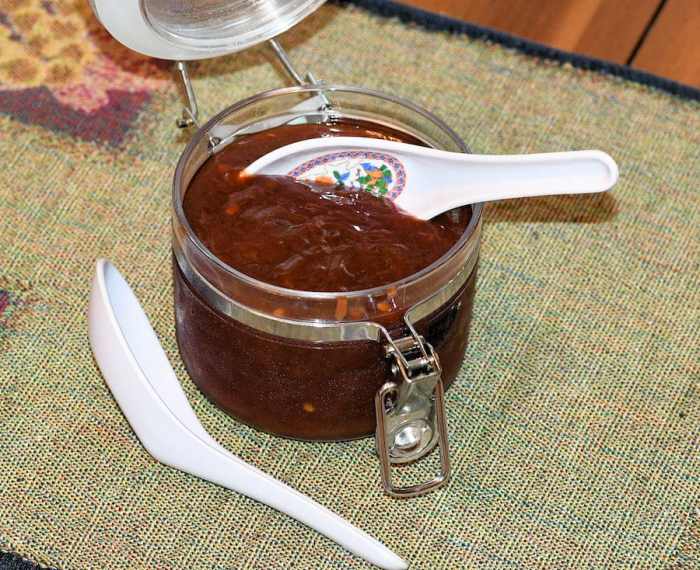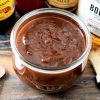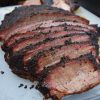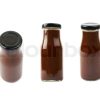Asian Barbecue Sauce Recipe A Flavorful Guide
Asian Barbecue Sauces: A Culinary Journey
Asian barbecue sauce recipe – Asian barbecue sauces represent a vibrant tapestry of flavors, each reflecting the unique culinary traditions of its region of origin. Unlike their Western counterparts, which often rely heavily on smoky flavors and tomato bases, Asian barbecue sauces showcase a diverse range of ingredients and techniques, resulting in a spectrum of sweet, savory, spicy, and tangy profiles.
Introduction to Asian Barbecue Sauces

Source: mychineserecipes.com
Asian barbecue sauces encompass a wide array of preparations, varying significantly across different Asian countries and regions. These sauces are not simply condiments; they are integral components of many dishes, adding depth and complexity to the overall flavor profile. Their history is deeply intertwined with local agricultural practices and culinary traditions, evolving over centuries to reflect regional preferences and available ingredients.
Key characteristics distinguishing Asian barbecue sauces from Western styles include a greater emphasis on soy sauce, fermented ingredients (like fish sauce or shrimp paste), and a broader spectrum of sweeteners, from sugar and honey to fruit purees. The use of rice vinegar or other Asian vinegars also contributes to their unique flavor profiles, often resulting in a balance of sweet, sour, salty, and umami elements that is rarely found in Western-style barbecue sauces.
Historically, these sauces developed alongside specific cooking techniques and regional ingredients. For example, the use of fermented ingredients reflects the historical importance of preservation methods in various Asian cultures. The evolution of these sauces mirrors the cultural exchanges and culinary innovations that have shaped Asian cuisine over time.
Key Ingredients in Asian Barbecue Sauces, Asian barbecue sauce recipe
The core ingredients that form the foundation of most Asian barbecue sauces are remarkably consistent across many regional variations. Understanding the role of each ingredient is key to appreciating the nuanced flavor profiles achieved.
- Soy Sauce: Provides saltiness and umami, acting as a foundational flavor component. Different types, such as light soy sauce, dark soy sauce, and tamari, contribute varying levels of saltiness, color, and sweetness.
- Vinegar: Offers acidity and balance, cutting through the richness of other ingredients. Rice vinegar, black vinegar, and apple cider vinegar are common choices, each imparting distinct flavor notes.
- Sweetener: Adds sweetness and depth, often balancing the salty and sour elements. Sugar, honey, brown sugar, and fruit purees (like pineapple or mango) are frequently used, each contributing unique flavor characteristics and levels of sweetness.
- Aromatics: Garlic, ginger, scallions, and chili peppers are commonly used to enhance the sauce’s complexity and provide aromatic depth.
- Other potential ingredients: Depending on the regional style, other ingredients may be included, such as sesame oil, fish sauce, oyster sauce, or fermented bean paste (doubanjiang).
The interplay between different types of soy sauce (light for color and salt, dark for color and umami), vinegars (rice vinegar for a mild tang, black vinegar for a sharper one), and sweeteners (brown sugar for molasses notes, honey for floral notes) greatly influences the final taste and character of the sauce.
Regional Variations in Asian Barbecue Sauces
Asian barbecue sauces exhibit remarkable regional diversity, reflecting the unique culinary traditions of each area. The following table highlights some key distinctions:
| Region | Key Ingredients | Flavor Profile | Notable Dishes |
|---|---|---|---|
| Korean | Soy sauce, gochujang (Korean chili paste), garlic, ginger, sesame oil, sugar | Sweet, spicy, savory | Bulgogi, galbi |
| Japanese | Soy sauce, mirin (sweet rice wine), sake, sugar, ginger | Sweet, savory, slightly tangy | Teriyaki, yakitori |
| Chinese | Soy sauce, rice vinegar, sugar, ginger, garlic, hoisin sauce (in some variations) | Savory, slightly sweet, tangy | Char siu, Peking duck (glaze) |
| Thai | Fish sauce, soy sauce, brown sugar, lime juice, garlic, chili peppers | Sweet, sour, spicy, savory | Grilled meats, seafood |
| Vietnamese | Fish sauce, soy sauce, sugar, lime juice, garlic, chili peppers | Savory, sweet, sour, slightly spicy | Grilled pork, lemongrass chicken |
Asian Barbecue Sauce Recipes
Three distinct recipes illustrate the versatility of Asian barbecue sauces:
Sweet and Savory Asian Barbecue Sauce
This recipe balances sweetness and savoriness for a well-rounded flavor.
- 1 cup soy sauce
- ½ cup brown sugar
- ¼ cup rice vinegar
- 2 cloves garlic, minced
- 1 inch ginger, minced
- 1 tablespoon sesame oil
Combine all ingredients in a saucepan. Bring to a simmer over medium heat, stirring occasionally, until the sugar dissolves and the sauce thickens slightly (about 10-15 minutes). Let cool before using.
Spicy Asian Barbecue Sauce
This recipe incorporates chili peppers for a fiery kick.
- 1 cup soy sauce
- ¼ cup brown sugar
- 2 tablespoons rice vinegar
- 2-4 Thai chili peppers, finely minced (adjust to taste)
- 2 cloves garlic, minced
- 1 tablespoon ginger, minced
- 1 teaspoon sesame oil
Combine all ingredients in a saucepan. Bring to a simmer over medium heat, stirring occasionally, until the sugar dissolves and the sauce thickens slightly (about 10-15 minutes). Let cool before using. Adjust chili quantity to your preferred spice level.
Tangy Asian Barbecue Sauce
This recipe emphasizes a bright, tangy flavor profile.
- 1 cup soy sauce
- ¼ cup pineapple juice
- ⅓ cup rice vinegar
- 2 tablespoons lime juice
- 1 clove garlic, minced
- 1 teaspoon grated ginger
Combine all ingredients in a saucepan. Bring to a simmer over medium heat, stirring occasionally, until the sauce slightly thickens (about 5-7 minutes). Let cool before using.
Pairing Asian Barbecue Sauce with Different Foods
The versatility of Asian barbecue sauces makes them ideal for a wide array of proteins and dishes.
- Chicken: Sweet and savory sauces pair well with grilled or roasted chicken, while spicy sauces complement stir-fried chicken.
- Pork: Korean-style barbecue sauces are excellent with grilled pork belly or ribs. Tangy sauces add a nice contrast to roasted pork loin.
- Beef: Japanese teriyaki sauce is a classic pairing with grilled beef, while a spicier sauce can elevate a beef stir-fry.
- Seafood: Thai-inspired sauces with fish sauce and lime are delicious with grilled seafood, particularly shrimp and fish.
- Tofu: Sweet and savory sauces can add depth of flavor to grilled or pan-fried tofu.
Visual Representation of Asian Barbecue Sauces
The visual appearance of Asian barbecue sauces varies greatly depending on the ingredients used. A sweet and savory sauce might have a rich, dark brown color with a glossy sheen, while a spicy sauce may have a vibrant red hue flecked with chili pieces. The texture can range from a smooth, pourable consistency to a slightly thicker, almost syrupy consistency, depending on the amount of thickening agents or reduction during cooking.
The inclusion of sesame seeds or other visible ingredients adds textural and visual interest.
Storage and Shelf Life of Asian Barbecue Sauce

Source: amazingribs.com
Proper storage is crucial for maintaining the quality and safety of Asian barbecue sauce. Homemade sauces should be stored in airtight containers in the refrigerator. They typically last for 3-5 days. Commercially produced sauces have longer shelf lives, as indicated on their labels, often lasting several months when unopened and stored according to instructions. Improper storage can lead to spoilage, changes in texture and flavor, and potential safety concerns.
Helpful Answers: Asian Barbecue Sauce Recipe
Can I use different types of vinegar in the recipes?
Yes, experimenting with different vinegars (rice vinegar, apple cider vinegar, etc.) will alter the flavor profile. Rice vinegar is common, but others can add unique notes.
How long does homemade Asian barbecue sauce last?
Properly stored in the refrigerator, homemade Asian barbecue sauce typically lasts for 1-2 weeks. Always check for spoilage before use.
Can I freeze Asian barbecue sauce?
Yes, freezing extends the shelf life. Freeze in airtight containers for up to 3 months.
What are some substitutes for soy sauce?
Tamari or coconut aminos can be used as soy sauce substitutes for those with soy allergies or preferences. Note that the flavor will be slightly different.













